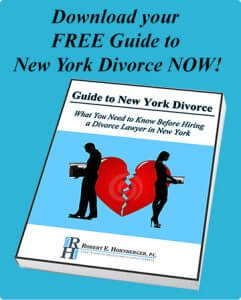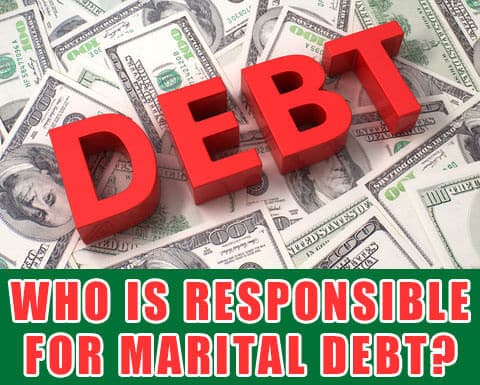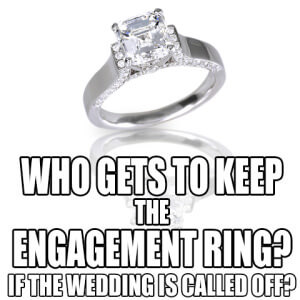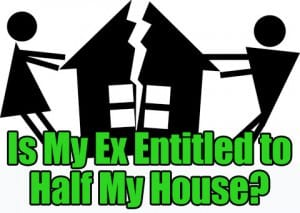
by Robert E. Hornberger, Esq | May 28, 2015

As a Divorce Attorney on Long Island, certain clients stand out as examples of the stress and misinformation many people have about divorce in Nassau and Suffolk counties
One client that remains at the forefront on my mind is an individual whose first words upon entering my office were this, “My spouse is NOT getting half of my motorcycle.”
This sentiment is near and dear to me, as I am an avid motorcycle enthusiast myself. I asked this individual where he got this idea from, and he calmly stated his wife had been using his beloved motorcycle as a bargaining chip throughout the course of their marriage.
Many clients have that certain item of personal property which they would never be willing to part with, and their spouse is often well aware of what it is and how much it means to them. This provides them with the opportunity for emotional “blackmail” during a Nassau County or Suffolk County Divorce. Fortunately, Section 236(B) of New York’s Domestic Relations Law clearly provides that the State of New York is an equitable distribution jurisdiction, which does not mean that assets are divided straight down the middle.
What is Equitable Distribution in Nassau County, Suffolk County, Long Island?
Equitable distribution is the process through which marital assets and debts are distributed during Long Island divorce proceedings. Rather than simply splitting the debts and assets on an equal (50/50) basis, the Court will take into consideration the totality of the circumstances as they may pertain to each party.
What Property is Subject to Equitable Distribution in New York?
As stated above, equitable distribution is the process by which marital debts and assets are distributed during your Long Island divorce. As it is “Equitable”, not “Equal”, certain property will not be subject to this type distribution scheme. Marital property is defined under Section 236(B)(1)(c) of the Domestic Relations law as “all property acquired by either or both spouses during the marriage and before the execution of a separation agreement or the commencement of a matrimonial action, regardless of the form in which title is held.”
You likely want to know what separate property is. Again, as defined in the Domestic Relations Law, separate property is “(1) property acquired before marriage or property acquired by bequest, devise, or descent, or gift from a party other than the spouse; (2) compensation for personal injuries; (3) property acquired in exchange for or the increase in value of separate property, except to the extent that such appreciation is due in part to the contributions or efforts of the other spouse; and (4) property described as separate property by written agreement of the parties pursuant to [Domestic Relations Law §236(B)(3)].”
Suppose either party purchased real estate or a plot of vacant land prior to the marriage. That house in Florida or vacant land in California remains the sole property of the person who purchased it prior to the marriage and is not “marital property”.
What Factors are considered in Equitable Distribution and How Does it Work?
Nassau County and Suffolk County courts will look at a variety of factors as further set forth in Section 236(B). These factors include, amongst other things:
- the income of each party at the time of the marriage
- the length of the marriage
- whether one spouse is receiving maintenance
- the loss of health insurance benefits upon dissolution of the marriage
Let us tie in the motorcycle example. Say the parties obtain an appraisal on Mr. Smith’s Harley Davidson motorcycle, and it is valued at $13,000. Mr. Smith does not have to sell his motorcycle and give Mrs. Smith $6,500, or one-half of the proceeds of the sale. Rather, Mr. Smith can retain the motorcycle as his sole, exclusive and separate property, and Mrs. Smith will be awarded assets approximately equal in value. Therefore, Mr. Smith retains the beloved motorcycle, and Mrs. Smith retains assets which equal the approximate monetary value of the Harley Davidson.
Are my Spouse and I Bound by New York’s Equitable Distribution Statute?
The simple answer to this question is No. As always, equitable distribution, and entering the court system, is a last resort. Many divorce attorneys on Long Island, including myself, will first attempt to settle a matter amicably, through 4-way settlement conferences and negotiation, rather than immediately requesting a court date. If the parties’ matter is not before a court, they are free to agree upon whatever property distribution settlement they may desire. However, if the parties are unable to reach a fair resolution of their matter, the only way to proceed with a Nassau County or Suffolk County divorce is to utilize the court system, and therefore, equitable distribution.
Receive a Free Consultation from an Experienced Divorce Attorney, Long Island’s Robert E. Hornberger, Esq.
If you have questions about property division during your Long Island divorce, you should immediately consult an experienced local divorce attorney. Long Island’s Robert E. Hornberger, Esq., PC’s compassionate and experienced divorce attorneys can help. Interested in learning more about our divorce attorney? Long Island residents are encouraged to call us at 631-923-1910 for a complimentary, confidential consultation or fill out the short form on this page and we’ll get right back to you
Download our Free New York Divorce Guide
 Our 41-page “Guide to New York Divorce: What You Need to Know Before Hiring a Divorce Lawyer in New York” written by an experienced Divorce Attorney Long Island’s Robert E. Hornberger, Esq., provides you with real information on the divorce process and the laws it rests upon in the state of New York. This book will help give you a solid foundation upon which you can begin the process of making your family’s, life better. Download your Free Guide to New York Divorce here.
Our 41-page “Guide to New York Divorce: What You Need to Know Before Hiring a Divorce Lawyer in New York” written by an experienced Divorce Attorney Long Island’s Robert E. Hornberger, Esq., provides you with real information on the divorce process and the laws it rests upon in the state of New York. This book will help give you a solid foundation upon which you can begin the process of making your family’s, life better. Download your Free Guide to New York Divorce here.

by Robert E. Hornberger, Esq | Jan 6, 2015
Who is Responsible for the Marital Debt In a Long Island Divorce?
As a Long Island Divorce Lawyer, I have heard hundreds of scenarios for how a spouse learns their partner wants to end the marriage and get a divorce. Of course, usually it is not a total surprise and both spouses knew the marriage was in trouble, but when it comes right down to it, hearing it in all it’s finality is a blow and starts your mind racing.
Essentially, it boils down to something like you come home from work one day to hear your spouse say the words “I want a divorce.” Naturally, hundreds of thoughts are racing through your mind, what about the kids, the house, and the family pet? Who will the children spend Christmas and Thanksgiving with; can I still take them to my mom’s in Florida? These thoughts are natural and practically immediate upon hearing those words. What is not usually so natural and immediate are the thoughts about what happens to the $27,000 worth of credit card bills your spouse incurred on your joint credit accounts only three weeks earlier.
(more…)
by Robert E. Hornberger, Esq | Nov 11, 2014
 As a Divorce Lawyer on Long Island, one of the questions I hear when marriages are called off, or even result in divorce is, “Do I get to keep my engagement ring?” or “Can I get the engagement ring back?”
As a Divorce Lawyer on Long Island, one of the questions I hear when marriages are called off, or even result in divorce is, “Do I get to keep my engagement ring?” or “Can I get the engagement ring back?”
In most relationships, one partner spends a significant amount of money on an engagement ring on behalf of the other partner. A lot of “advice” on this topic suggests the proposer should spend two months’ salary on the engagement ring. Naturally, one would assume that the partner who purchased the ring was entitled to keep it or get it back if the engagement is called off, but that’s not always the case. Who gets to keep the ring is solely centered upon whether that ring was a straightforward gift from one partner to the other, or if the ring was solely a gift in contemplation of marriage. In any case, once the marriage occurs, the engagement ring is usually considered to be the property of the recipient, unless the couple comes to some other agreement.
What is a Gift in Nassau County or Suffolk County Courts?
When you think of the word “gift” your mind likely jumps to special days like birthdays, anniversaries, etc. or holidays like Christmas, Hanukkah, Valentine’s Day, etc. due to the giving and/or receiving of beautifully wrapped presents. However, clothes or jewelry do not require wrapping paper to be considered a gift. So long as the giver has the intent to give a gift, the same is delivered to the recipient, and the recipient accepts it, a gift has been made. Upon the satisfaction of the above three requirements, the gift becomes irrevocable.
So, Does the Recipient Always Get to Keep the Engagement Ring?
If the parties never marry, the answer in Suffolk County and Nassau County courts on Long Island is an emphatic “no”. Most states, including New York, require the recipient to return the engagement ring to the giver because the ring is classified as a conditional gift. The condition placed upon the gift, naturally, is the marriage of the parties. If the condition is not satisfied and the marriage is called off, the engagement ring must be returned to the giver, regardless of whose fault the broken engagement is.
The recent Nassau County case of Torres v. Lopez demonstrates this point
The Defendant testified as follows: Although there was no marriage proposal, the Plaintiff had given the Defendant a diamond ring in April of 2010, after at least six years of dating and referring to each other as “spouses”. The Plaintiff’s reasons for purchasing this ring were to show his appreciation to the Defendant for being a good mother. However, the Defendant contributed $4,500 of her own funds toward the purchase of such. Additionally, when asked by friends and family if the ring was an engagement ring, the Defendant always stated that she was not sure yet because the Plaintiff had never asked her to marry him. Sometime in October of 2011 the Plaintiff and Defendant parted ways, and the Defendant eventually moved out of the parties’ shared apartment.
The Plaintiff’s testimony: The Plaintiff testified that the ring was an engagement ring, and therefore he was entitled to its return. According to the Plaintiff, the Defendant did not contribute funds to its purchase price, the two referred to each other as “fiancée”, the Defendant’s family had already begun planning an engagement party for the couple, and the couple had looked at wedding venues. However, upon the relationship’s demise, the Defendant refused to give the Plaintiff the ring back.
Weighing the testimony of both parties against the other, the Court found the Defendant’s testimony to be more credible. While the factual issues presented were close, the Plaintiff had the burden to establish by a preponderance of the evidence that the ring was given to the Defendant in contemplation of marriage. Because he called no other witnesses, submitted no bank records, no receipts stating that the ring was an engagement ring, or anything else evidencing the fact this was not an unconditional gift, the Court held that Plaintiff was entitled to keep the ring.
What Does This Mean For Me?
Therefore, while it seems the outcome of these situations may be highly fact-specific, it is important to note that if it is not clear whether or not the ring was an “engagement ring” given upon the condition that the parties would marry, the recipient may be entitled to retain its possession. If you are thinking of a marriage proposal, you may even wish to ensure the invoice or receipt states that the ring is in fact an engagement ring. As always, it is important to discuss the specifics of your case with your Long Island Divorce Attorney.
Distribution of Property in Divorce Questions?
Compassionate Long Island Divorce Attorney Has Answers
The experienced and compassionate divorce attorneys at Robert E. Hornberger, Esq. P.C. have helped hundreds of Long Island couples resolved their divorce and legal separation issues amicably and affordably. Contact us today at 631-923-1910 to schedule your free, no-obligation consultation with an experienced Long Island divorce attorney.
by Robert E. Hornberger, Esq | Oct 14, 2014
Is My Ex Entitled to Half My House? Long Island Divorce Attorney Weighs In
I Bought the Marital Residence Prior to My Marriage, is My Partner Entitled to Half the House When We Get Divorced?
 Equitable Distribution of marital property is one of the main issues we work with every day as Divorce Attorneys on Long Island. One of the largest assets of most couples is their Long Island home, so naturally, equitably distributing any equity in that home becomes a major issue in the divorce cases we represent. The issue has become slightly more complex in recent years as one or both of the spouses may purchase a home prior to marriage.
Equitable Distribution of marital property is one of the main issues we work with every day as Divorce Attorneys on Long Island. One of the largest assets of most couples is their Long Island home, so naturally, equitably distributing any equity in that home becomes a major issue in the divorce cases we represent. The issue has become slightly more complex in recent years as one or both of the spouses may purchase a home prior to marriage.
You bought your house 10, or even 15 years ago. Maybe you were dating your partner or maybe you were single; either way, you used your own funds to make the down payment on the residence. Your relationship is going well, or you enter a new relationship, and you ask your partner to move in with you. You live together for a period of time and then decide to get married and the residence you purchased served as the marital residence. Unfortunately, you now find yourself facing a divorce. Your partner is claiming a right in the residence that you purchased, including a portion of the down payment, and naturally, you are fighting that assertion.
Where it used to be that a couple seeking to buy a home would purchase the marital residence with marital funds, the above scenario is becoming increasingly common. Many individuals in relationships find themselves plagued down with debt and student loans, and therefore it happens that only one or the other can afford to purchase a home. One purchases the home with his or her separate funds and both live in the residence. Of course at the time of buying a home together or asking your partner to move in, you are not thinking of the consequences if years down the road after marriage either one of you seeks a divorce.
Did I Gift the Equity in My Home to My Partner?
If you purchased the residence with your own funds, you likely do not want to lose half of that amount to your partner. A New York case, Koehler v. Koehler, deals directly with this issue, and stands for the proposition that the purchasing spouse may be able to recover the entire down payment, leaving the non-purchasing spouse with no interest in the same.
In Koehler, the parties were engaged to be married when the Plaintiff purchase a piece of real property using her own separate funds. However, she placed title to the property in the name of both the Plaintiff and the Defendant as joint tenants. The parties moved into the residence together and the Plaintiff continued to pay all the expenses related to the residence, including the maintenance and improvements. The Plaintiff thereafter filed for divorce, and the Defendant asserted that the Plaintiff had intended to gift him 50% of the value of the real property. Although the Court concluded that the real property was marital property and generally subject to equitable distribution, it held that to award the Defendant any portion of the original purchase price paid by the Plaintiff would be unconscionable. It is important to note that the Defendant was entitled to an equal share of any sum in excess of the purchase price. Additionally, while placing the title of real property in the name of another individual raises a presumption of donative intent, that presumption can be rebutted with credible evidence to the contrary. The Court found that the Plaintiff did not intend to gift the real property to the Defendant, but rather the transfer was the result of Plaintiff’s affection for the Defendant and her desire to ensure he had a place to live during their marriage and in the event she were to predecease him. Additionally, the Court noted that even if there was donative intent on behalf of the Plaintiff, “the fact that the purchase was consummated through the sole use of the [P]laintiff’s resources negates any right of the defendant to obtain any recoupment beyond the value of his own contribution.”
New York’s Second Department also briefly addressed this issue in Vincent v. Vincent. In Vincent, the parties took title to a piece of real property as joint tenants, with the Plaintiff providing $28,000 toward the purchase price and the Defendant providing less than $3,800. The Defendant’s claim that he was a joint owner of the property and therefore had a 50 percent interest in the property, including the purchase price, was rejected. The Court stated that “[w]hile a party may legally hold joint title to property, a constructive trust will be imposed if it can be shown that the property was acquired under such circumstances that the holder of the legal title should not [] retain it.”
What Does This Mean for Me in My Long Island Divorce?
If you purchased your marital residence with your own separate funds before your marriage, it is important to be aware that there is New York case law supporting the fact that you may recover 100 percent of that down payment or even the entire purchase price of the home. Each case is different, and there are likely many factors which may alter the conclusion. If you find yourself in this position it is important to discuss these issues with your Long Island Divorce Attorney.
Free Divorce Consultation with Long Island Divorce Attorney Hornberger Verbitsky, P.C.
Have questions about how to equitable divide your property during your Divorce on Long Island? The compassionate and experienced Long Island Divorce Attorneys at Robert E. Hornberger, Esq., PC are here to help. We have a long and successful history of representing couples and individuals in Nassau and Suffolk County to ensure their interests are protected during their divorce. Contact us at 631-923-1910 for a complimentary divorce consultation, or fill out the form on this page and we’ll get right back to you.
For more information about Property Division in your divorce, visit our Complete Guide to Dividing Property in Divorce.
GET YOUR FREE CONSULTATION TODAY
Call 631-923-1910 or fill in the form below

Horberger Verbitsky, P.C. partners Robert E. Hornberger, Esq. and Christine M. Verbitsky, Esq.
Get your complimentary consultation and case evaluation with our experienced Suffolk County divorce lawyers or family law attorneys today.
Your attorney will describe the many options available and determine together which is the right solution for you. By the end of this conversation, we’ll all understand how we can best help you to move forward.
No Cost or Obligation
There is no cost or obligation for this initial consultation. It is simply an opportunity for us to get to know each other, answer your questions and learn if Hornberger Verbitsky, P.C. is the right law firm for you. Give us a call at 631-923-1910 or fill in the short form below for your free consultation and case evaluation.
All Fields Are Required
by Robert E. Hornberger, Esq | Oct 7, 2014
As the Noncustodial Parent of Long Island Divorce, Can I Claim My Children as Dependents on my Income Taxes?
 As a Divorce Attorney on Long Island, I am often asked “who gets to claim the children on our taxes?” While you were married, it is likely that you and your ex-spouse filed joint income tax returns. You combined both of your incomes, and simply noted the number of children you had so you both were awarded the tax benefit of the children as dependents. However, along with a divorce comes the question of which parent can claim the children on their income tax returns, and how to make that decision. While you may automatically assume that the custodial parent is entitled to claim the children on his or her tax returns, this is not always the case and it is important to be aware of the possible outcomes.
As a Divorce Attorney on Long Island, I am often asked “who gets to claim the children on our taxes?” While you were married, it is likely that you and your ex-spouse filed joint income tax returns. You combined both of your incomes, and simply noted the number of children you had so you both were awarded the tax benefit of the children as dependents. However, along with a divorce comes the question of which parent can claim the children on their income tax returns, and how to make that decision. While you may automatically assume that the custodial parent is entitled to claim the children on his or her tax returns, this is not always the case and it is important to be aware of the possible outcomes.
Do You Have a Stipulation of Settlement in Your Long Island Divorce?
Many Long Island couples who are going through a divorce execute what is known as a Stipulation of Settlement. This document sets forth all the agreements you and your spouse have made regarding major issues, including child custody and support, what to do with the former marital residence, and property distribution.
An additional benefit of a Stipulation of Settlement is that you and your partner can include a section in the agreement concerning tax deductions and exemptions if you are both able to agree who will be claiming the children. What is becoming more commonplace is an agreement that the father will claim the children in odd years and the mother will claim the children in even years (or vice versa). If you have an odd number of children, such as three, it is not unheard of to permit the father to claim two children in odd years and one child in even years, with the mother claiming two children in even years and one child in odd years (or vice versa). Essentially, you and your ex-spouse can formalize any arrangement that you feel works best for you in your stipulation of settlement, and your Long Island divorce attorney may be able to suggest arrangements you had never thought of.
If Your Long Island Divorce Attorney Recommends Litigation
While you may want to execute a Stipulation of Settlement, it may be the case that you and your partner are simply unable to reach an agreement about one or more issues. In such instances, you can execute a Stipulation of Settlement for the issues you do agree on, and then may need to litigate on the issues you do not agree on. On occasion, the issue of which parent will claim the child as a tax deduction becomes an issue couples are unable to agree upon. In that case, the issue may require litigation. Although many believe that the custodial parent will be the one permitted to claim the child, that is not always the case; many consider that when both parents are contributing to the well-being of the child, and both parents should be entitled to the tax deduction.
Courts in New York have expressed this same sentiment. In Pachomski v. Pachomski, a Second Department case, both the custodial and the non-custodial parent were entitled to claim the children as dependents in alternating odd and even years for state and federal tax purposes. The Court reached its conclusion that “[w]here a noncustodial parent meets all or a substantial part of the child’s financial needs, a court may determine that the noncustodial parent is entitled to declare the child as a dependent” because both parents were wage earners and both contributed towards the support of the children. A similar conclusion was reached by the Court in Jurgielewicz v. Jurgielewicz. The father, who was the noncustodial parent was contributing “the majority[] of the financial support of the children.” The Court held that under the circumstances “[it] may determine that the noncustodial parent is entitled to declare the children as dependents on his or her income tax returns.” Additionally, the Court expressly stated that “it is within the sound discretion of the court to direct that the noncustodial parent be entitled to the dependency exemption for the purposes of filing income taxes where the custodial parent has little taxable income and, thus, is unable to take full advantage of the dependency exemption.” See Mojdeh M. v. Jamshid A. Therefore, the court is permitted to look at the circumstances of each individual case and consider the income of each parent when deciding a tax deduction issue.
A tax deduction is essentially a benefit granted to parents when they file their income taxes; it recognizes the amount of money required to care for and support children. When the children’s parents are married, both file income taxes jointly and both reap the benefits. However, when parents are divorced, who will claim the child can become an issue, and that is when it is time to speak to your Long Island divorce attorney for possible solutions.
Contact an Experienced Divorce Attorney on Long Island to Protect Your Interests
The compassionate Long Island divorce attorneys at Hornberger Verbitsky, P.C. are very experienced at negotiating Stipulation of Settlements that fairly protect your interests today and into your future. Contact us at 631-923-1910 for a complimentary confidential divorce and family law consultation or fill out the short form on this page and we’ll get right back to you.
by Robert E. Hornberger, Esq | Jul 8, 2014
 The legalization of Same-Sex Marriages in New York has far-reaching implications for Long Island couples who have children in these marriages, particularly with regards to death, divorce and child support. While both spouses cannot be biological parents of the child or children of the marriage, should the non-biological parent/s and children born during that marriage be afforded the same legal protections opposite-sex spouses have enjoyed?
The legalization of Same-Sex Marriages in New York has far-reaching implications for Long Island couples who have children in these marriages, particularly with regards to death, divorce and child support. While both spouses cannot be biological parents of the child or children of the marriage, should the non-biological parent/s and children born during that marriage be afforded the same legal protections opposite-sex spouses have enjoyed?
Children Born of Marriage Deemed ‘Legitimate’ on Long Island, NY
The law in New York provides presents a strong presumption of legitimacy to children born of a marriage. This presumption arises not only from case law rulings, but also from its codification in Section 24 of New York’s Domestic Relations Law. Both provide that any child born to married parents is presumed to be “the legitimate child of both parents.” Non-marital children, therefore, are not afforded this presumption, and are seen as the legitimate child of only the mother.
Benefits of Legitimacy
In order to be the legitimate child of the father, there must be facts and circumstances to prove such. While you may be wondering why this matters, one important benefit of being afforded said presumption is what happens upon the death of a parent to whom the child is not deemed to be a legally legitimate child.
When an illegitimate child’s father dies without a will, the child must prove paternity, either through a court order or other evidence, such as the father having held the child out as his own during his lifetime, in order to inherit through the father’s intestate distribution scheme.
A second issue arises upon the divorce or separation of a couple. A parent is entitled to visitation and/or child support for a child born of a marriage; however, a parent of an illegitimate child may be legally excluded from seeing that child upon divorce or separation. Accordingly, the presumption affords marital children a large benefit over non-marital children. However, with the recent passing of New York’s Marriage Equality Act, which recognizes same-sex marriages, the issue of whether this presumption applies to same-sex marriages as well has reached the courts.
Wendy G-M. v. Erin G-M.
This case, which was heard in New York’s Supreme Court in Monroe County, centered on a child born to a same-sex couple via artificial insemination. The couple, which was legally married, consented to the procedure and executed a document providing that any child born of the procedure would be “accepted as the legal issue of [the] marriage.” The non-birthing spouse was involved in the process and pre-birth rituals, such as birthing classes and name choosing, to the same extent as the birth-spouse was, and the child’s birth certificate has both women listed as her parents. Not long after the birth of the child, the couple separated, the birth-spouse filed for divorce and subsequently prohibiting her partner to visit with the child. If the non-birth parent was considered to be the child’s legitimate parent, she would have a right to visitation and the birth mother could not legally prohibit that right without a court order.
Does the Same Presumption Apply to Same-Sex Marriages?
Because the New York Courts had previously held that the term “parent” does not contain gender-specific boundaries, the court in Wendy G-M. v. Erin G-M. held that the presumption of legitimacy applies to children born of same-sex marriages as well.
Furthermore, courts have stated that any changes in the definition of the term “parent” cannot come from case law, but rather should come from changes in legislation that represent the growing views of the community. More specifically on the topic of artificial insemination, the Domestic Relations Law provides that a child born of artificial insemination is not the legitimate child of the anonymous donor, but of the husband and wife to which the child is born. Therefore in such instances, when all statutory requirements are met, there is a rebuttable presumption that a child born of artificial insemination is the child of the marriage.
So long as both parents consent to and are involved in the procedure, and there is intent that both parties be considered to be the legitimate parents of the child, there is no legal difference between opposite or same sex marriages. As with most, this presumption is rebuttable and can be negated by either spouse; “the birth-mother could produce evidence that she never intended her spouse to be the parent … [and] the unknowing, non-biological spouse, would be required to overcome the presumption of consent, and prove lack of consent.”
What Does this Mean for Me on Long Island?
If you are in a same-sex relationship in New York, any child born of your marriage through artificial insemination, so long as there is consent on behalf of both of you and your partner, will be presumed to be the legitimate child of the marriage. Therefore, if you are seeking a divorce, the birth-spouse cannot prohibit the non-birth parent from visitation rights with the child, nor can be excused from child support payments.
Have Questions About Your Parental Rights and Responsibilities? Speak to an Experienced and Compassionate Long Island Divorce Attorney
The Long Island divorce attorneys and divorce mediators at the law firm of Hornberger Verbitsky, P.C. are experienced in all aspects of divorce law on Long Island, including those impacted by the recent Marriage Equality Act. To schedule an appointment for a complimentary consultation to discuss your case, contact our offices at 631-923-1910.
by Robert E. Hornberger, Esq | Mar 18, 2014
How Much Will I / My Spouse Get In My Divorce?
 One of the most difficult issues that arise in a Long Island, NY divorce, aside from those regarding child custody, are how to divide your property with your soon to be ex-spouse, including the marital home, but also your other material assets. Because of the difficulty of this situation, you and your partner may not be able to reach an agreement regarding the division of property on your own. If that is the case, the court will be authorized to settle the division of the property. However, if you wish to avoid adding another litigated issue to your divorce, it is important to discuss with your divorce attorney how you and your partner can reach a mutual agreement on property division issues.
One of the most difficult issues that arise in a Long Island, NY divorce, aside from those regarding child custody, are how to divide your property with your soon to be ex-spouse, including the marital home, but also your other material assets. Because of the difficulty of this situation, you and your partner may not be able to reach an agreement regarding the division of property on your own. If that is the case, the court will be authorized to settle the division of the property. However, if you wish to avoid adding another litigated issue to your divorce, it is important to discuss with your divorce attorney how you and your partner can reach a mutual agreement on property division issues.
What is the Law in New York Regarding Property Distribution?
New York is an equitable distribution jurisdiction, which means that all marital property will be divided equitably among you and your soon to be ex-spouse. Keep in mind – equitable distribution does not automatically entitle you to an equal distribution of property. Rather, , to ensure distribution is fair and just, each distribution is made on a case-by-case basis depending on the specific individual circumstances involved.
What is Marital Property?
Marital property includes all property earned by either you or your partner during the marriage. Naturally, separate property includes that which was acquired before the marriage. Separate property also includes any gifts or inheritances received by one spouse and personal injury or other similar settlements, regardless of whether or not they were acquired during the marriage. Furthermore, you and your partner are free to make any agreement regarding separate and marital property, so if you did enter into a pre-nuptial agreement, that agreement will govern what constitutes marital property and what constitutes separate property. A point that may serve to surprise you is the fact that New York considers business degrees and professional licenses obtained during the marriage as marital property. Therefore, if you received one of these degrees during your marital relationship, your partner is entitled to share in the increase in earnings due to the degree, even if he or she was unemployed during the marriage.
What Other Factors Are Taken Into Consideration?
- Income. One factor taken into consideration is the income of you and your partner: both during the marriage and at the time the action for divorce is commenced. Therefore, it is important to keep close account of your finances and to inform your divorce attorney of any changes in income from the time of the marriage to the commencement of the proceeding.
- Health. Additionally, the health and age of both you and your soon-to-be ex-spouse are important. If you are facing the possibility of losing health insurance due to the divorce, it is important to inform your divorce attorney of this fact, especially if you are suffering from an illness. The purpose of equitable distribution is to ensure that the distribution of the marital assets is fair and just, therefore, if you are ill and set to lose insurance, you may be awarded a greater share of the assets than your healthy spouse.
- Pension. You may also face the loss of pension benefits after your divorce. If your spouse is the holder of a pension plan, a divorce serves as an automatic revocation of your rights under this plan (so long as this is not inconsistent with standing federal law, so be sure to check with your divorce attorney).
- Waste of Assets. Further, any extreme disregard for finances during the marriage (such as excessive gambling, etc.) will also be taken into consideration in making the equal distribution determination.
- Fault or Misconduct. Important to note is the fact that any fault or misconduct on behalf of you or your partner is not taken into consideration unless it is egregious (generally, egregious is considered an attempted homicide of a spouse). Therefore, if either of you feel the other is “at fault” for the dissolution of your marriage, it is helpful to be aware that that is not used to determine what is fair and equitable.
What About the Marital Home?
Aside from child custody issues, what to do with the marital home is often one of the most pressing issues that arise during a divorce. Rather than have the court decide who retains possession, or whether your home will be sold to a stranger, it may be beneficial if you and your partner take the time to decide this issue between yourselves. If you and your partner cannot reach an agreement, the court will mostly consider which spouse has custody of the children.
Need More Help With Your Property Division In Your Long Island Divorce?
The compassionate divorce lawyers at the law firm of Hornberger Verbitsky, P.C. have helped hundreds of Long Island couples like you divide their property fairly and equitably. We represented and protect your issues to ensure you receive what’s fair and ensure you are not taken advantage of by your ex-spouse. If you have more questions about how to divide your property with your former spouse, give us a call at 631-923-1910 for a confidential and complimentary consultation in our comfortable and convenient offices in Melville, right off Route 110, just south of the LIE. Don’t let your spouse get more than he or she is entitled to. Call us today or fill out the short form on this page and we’ll get right back to you.
See this page for Your Guide to Preparing for a Contested Divorce.
by Robert E. Hornberger, Esq | Jun 13, 2013
Dividing Assets in Long Island Divorce is Complex
 As a Long Island, NY divorce attorney, I see that many couples contemplating divorce in Nassau and Suffolk have many difficult issues that must be sorted out including, equitable distribution of property, assets and debts, child support, and alimony, spousal support or spousal maintenance.
As a Long Island, NY divorce attorney, I see that many couples contemplating divorce in Nassau and Suffolk have many difficult issues that must be sorted out including, equitable distribution of property, assets and debts, child support, and alimony, spousal support or spousal maintenance.
Owning a Business Makes Long Island Divorce More Complicated
When the divorcing couple owns a business, this often becomes the most difficult and most controversial marital asset, causing additional valuation and distribution issues to consider.
What is ‘Double-Dipping’?
In divorce cases on Long Island, attorneys refer to situations where one spouse receives double payment for a single asset as “Double Dipping” or “Double Counting”. These terms are also applied to pension funds as well as business interests.
Nassau & Suffolk Exclude Pension & Alimony
Generally speaking, during a divorce proceeding, Nassau County and Suffolk County Courts do not allow a spouse to receive both an equitable distribution of pension assets and alimony based on that same pension income. However, this is less clear when it is applied to business interests.
Different States, Different Laws
Depending on the state in which the divorcing spouses live and are seeking their divorce, when the non-monied spouse receives alimony or maintenance, some or all of the company’s goodwill may be excluded from the marital estate when dividing the assets.
No Double-Dipping in Nassau County or Suffolk County Courts
In New York, this issue became explained when the Court of Appeals in Grunfeld v. Grunfeld (94 N.Y.2d 696 [2000]) recognized the inequity of double-counting income, at least when awarding spousal maintenance after the asset value of a license or degree has been divided. Therefore, in Nassau County and Suffolk County Courts, double dipping is not allowed.
Seek an Experienced Long Island Divorce Attorney
Dividing marital assets in a Long Island divorce can be very complex and requires an experienced divorce attorney familiar with the Nassau County and Suffolk County court system. The attorneys at Robert E. Hornberger, P.C., have received extensive training and have a great deal of experience in these areas and are ready to answer your questions. For a free private consultation about this or any other divorce matter, contact the experienced attorneys at Robert E. Hornberger, PC at 631-923-1910 or fill out the form on this page and we’ll get right back to you.
Questions About Contested Divorce on Long Island?
To learn more about what you need to know about Contested Divorce on Long Island and how to get help to protect yourself and your future to ensure you have the freedom and resources to live a full and happy post-divorce life, visit this page: Contested Divorce Attorney Protects Your Rights & Assets. For more information on Contested Divorce, read What You Need to Know About Contested Divorce.
by Robert E. Hornberger, Esq | Apr 25, 2013
Protect Your Finances & Health During Your Divorce
 As a Divorce Attorney on Long Island, I’ve helped hundreds of couples navigate the often rocky road through their divorce proceedings. From simple, uncontested divorces through complex litigated divorces, there are a myriad of complex legal, emotional and financial issues that must be resolved to finalize your divorce and move on with your life.
As a Divorce Attorney on Long Island, I’ve helped hundreds of couples navigate the often rocky road through their divorce proceedings. From simple, uncontested divorces through complex litigated divorces, there are a myriad of complex legal, emotional and financial issues that must be resolved to finalize your divorce and move on with your life.
While the family and divorce law firm of Robert E. Hornberger can help you with the legal issues surrounding your divorce and help you divide your assets, we often recommend that you seek the advice of a qualified financial planner to help you with your ongoing financial needs.
To protect yourself and set yourself up for success, it’s critically important to keep track of your financial records during a divorce and there are a few specific areas of concern.
Establish or Maintain Your Credit
It’s important as you go through your divorce, that you establish or maintain your credit worthiness. Couples going through a divorce often struggle to obtain credit because theirs assets and credit are often tied up with their spouse’s. You should attempt to acquire bank and department store cards in your own name, apart from being an authorized user on your spouse’s cards. In addition to protecting your credit score, you will also ensure that your spouse is not able to cancel your cards and cut off your access to credit when you may need it most.
Keep Cash on Hand
Another good practice is to make sure you have cash on hand. If you haven’t filed divorce papers yet and still live with your spouse, it’s important to make sure that you have access to cash. Legal fees, court costs and new living expenses can drain any account. Keep in mind that the money that used to support one household will now have to be divided into two.
Maintain Your Health Insurance
Another often overlooked are of exposure is your insurance policies. It is recommended that you thoroughly review, and ask your attorney to review, your insurance policies and your insurance needs. While going through your divorce you will want to make sure that you are still entitled to medical benefits. Make sure to talk to your attorney regarding your health insurance coverage, especially if your spouse provides you with health insurance. In most divorce cases, the spouse receiving medical insurance from the other spouse is likely to lose their coverage if it is not specifically addressed in your divorce or separation agreement. Be sure to discuss your needs with your attorney.
Contact Us for More Information
The Divorce and Family Law Firm of Robert E. Hornberger, P.C. is experienced protecting the financial and insurance needs of our clients. If you have any questions regarding these issues, we will be delighted to assist you. Give us a call at 631-923-1910 to schedule a free complimentary consultation to discuss your needs and options.
by Robert E. Hornberger, Esq | Apr 18, 2013
What You Need to Know About Qualified Domestic Relation Orders During Your Divorce
 As a divorce attorney practicing primarily in the Nassau County and Suffolk County Supreme and Family Courts in NY, I work with many couples who have complex financial matters to divide in their divorce settlement. While some property and assets are relatively simple to split up, one of the most complex aspects of a divorce settlement can be the division of retirement or pension plans. These plans fall under the terms of a Qualified Domestic Relations Order or QDRO.
As a divorce attorney practicing primarily in the Nassau County and Suffolk County Supreme and Family Courts in NY, I work with many couples who have complex financial matters to divide in their divorce settlement. While some property and assets are relatively simple to split up, one of the most complex aspects of a divorce settlement can be the division of retirement or pension plans. These plans fall under the terms of a Qualified Domestic Relations Order or QDRO.
QDRO and ERISA
A Qualified Domestic Relations Order (QDRO) is a legal order subsequent to a divorce or legal separation that splits and changes ownerships of a retirement plan to give the divorced spouse their share of the asset or pension plan. QDRO’s are only subject to employee benefit or pension plans subject to the Employee Retirement Income Security Act (ERISA), which is the law that governs private sector pensions. These orders provide for marital or community property division between the participant and the alternate payee. A QDRO also qualifies for the payment of alimony or child support to the alternate payee.
The QDRO must meet the following requirements:
1. Contain the names and mailing addresses of the Participant and Alternate Payee
2. Clearly set forth the amount or percentage of the Participant’s benefits
3. Set forth the number of payments or period to which the Order applies
4. Refer to each Plan to which the Order applies
5. NOT require a Plan to pay any type or form of benefit, or any option not otherwise provided under the Plan
6. NOT require the Plan to provide increased benefits determined on the basis of actuarial value
7. NOT require a Plan to pay benefits to an Alternate Payee that are required to be paid to another Alternate Payee under another Order previously determined to be a QDRO.
Orders relating to these non-ERISA Plans are not “Qualified” and are simply called “Domestic Relations Orders” or DROs. They may be subject to state law or agency policy prior to acceptance and approval by the governmental plan.
QDROs can be difficult to properly utilize because every Plan is different and may contain different benefits, survivorship options, terms and procedures for administration and are constantly changing.
Contact Us for More Information
If you have any questions regarding how a pension or retirement account should be divided in your divorce or separation agreement, give us a call at 631-923-1910. The divorce law office of Robert E. Hornberger, P.C. will be pleased to offer you a free complimentary consultation to discuss your options.

 Our 41-page “Guide to New York Divorce: What You Need to Know Before Hiring a Divorce Lawyer in New York” written by an experienced Divorce Attorney Long Island’s Robert E. Hornberger, Esq., provides you with real information on the divorce process and the laws it rests upon in the state of New York. This book will help give you a solid foundation upon which you can begin the process of making your family’s, life better. Download your Free Guide to New York Divorce here.
Our 41-page “Guide to New York Divorce: What You Need to Know Before Hiring a Divorce Lawyer in New York” written by an experienced Divorce Attorney Long Island’s Robert E. Hornberger, Esq., provides you with real information on the divorce process and the laws it rests upon in the state of New York. This book will help give you a solid foundation upon which you can begin the process of making your family’s, life better. Download your Free Guide to New York Divorce here.





















